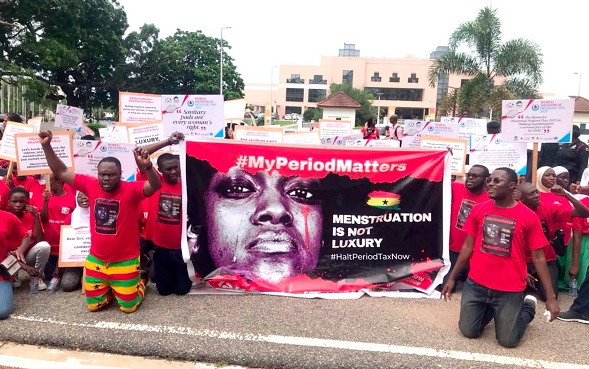
CSOs petition govt to reclassify sanitary pads
A Coalition of 112 Civil Society Organisations (CSOs) has petitioned the government to reclassify sanitary pads as “essential medical necessities”.
That, it said, would make hygiene products have zero tax rating and increase the country’s chances of attaining related Sustainable Development Goals (SDGs), including goals 3, 4, 5 and 6.
The petition was signed by the National Coordinator, Levlyn Asiedu Konadu, on behalf of the CSOs and presented to Parliament, Ministry of Health, Ministry of Finance and the Ministry of Gender, Children and Social Protection.
The demonstration was part of activities to commemorate World Menstruation Day which was observed last Sunday.
The celebration highlighted the importance of menstrual care and raised awareness of the issues faced by those who did not have access to sanitary products.
It was also to break the silence around periods, tackle the stigma often associated with them, and raise awareness of the importance of menstrual hygiene for women and girls.
Demands
The petition called for expedite actions to scrap the tax on sanitary pads.
“Currently, the government, under the Harmonised System Code 9619001000, classifies sanitary pads as ‘Miscellaneous Manufactured Articles’ which attract a myriad of taxes including: 20 per cent import duty; 15 per cent Import VAT and other import levies”, the petition stated.
The petitioners urged the government to increase investment and budgetary allocation and release funds to relevant sector ministries, departments and agencies, to increase public education and awareness-creation about menstrual health and hygiene management and provision of Water, Sanitation and Hygiene facilities (WASH).
It said such interventions would help break the discriminatory social and gender norms, misconceptions, stigma and other difficulties associated with the menstrual period in the country.
Affordability
According to the petition, many adolescent girls and women experience a significant lack of access to clean and affordable menstrual products, as well as information and knowledge about basic menstrual hygiene practices.
“Health experts suggest that due to increasing poverty levels, which have been exacerbated by the recent global economic crises, most homes, especially in low-income communities, cannot afford to provide girls and young women with the necessary menstrual hygiene products to help them manage their periods with dignity and without stigma and shame,” the petition added.
The petitioners contended that the promise by the government to remove import duties on sanitary pads if they won the 2020 election had not been translated into concrete actions.
“It remains unfulfilled nearly three years after the promise was made. Instead, the cost of sanitary pads continues to escalate due to the ever-increasing taxes imposed on consumer goods,” the petition noted.
The petitioners were of the view that any policy which discriminated against a section of the population and pushed them into further poverty has no place in an inclusive and democratic environment.
They maintained that the imposition of taxes on sanitary pads directly targeted at females makes the tax highly discriminatory, unjust and immoral.
